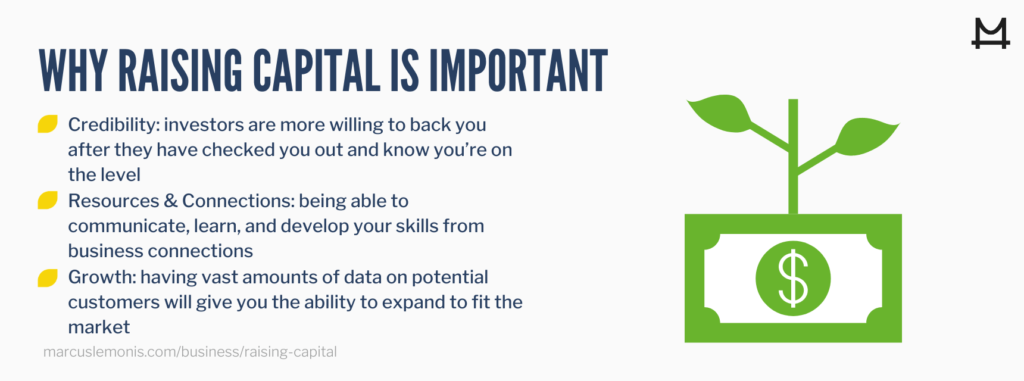How Can You Raise Capital For A Business

Imagine this: You're sitting at your kitchen table, a steaming mug of coffee warming your hands. Scattered around you are sketches, spreadsheets, and dreams – the tangible beginnings of your own business. The idea is brilliant, the market is ripe, but one crucial piece is missing: the capital to bring it all to life. The question isn't whether your vision can succeed, but rather, how to fuel its growth.
Raising capital is a fundamental challenge for nearly all entrepreneurs, but understanding the landscape of funding options – from bootstrapping and angel investors to venture capital and strategic partnerships – is key to securing the resources needed to launch and scale a successful business.
Understanding Your Funding Needs
Before diving into potential funding sources, it's essential to clearly define your capital needs. Conduct thorough market research and develop a robust business plan. Accurate financial projections are critical.
Determine exactly how much money you need. Be realistic and don't underestimate your startup costs.
Bootstrapping: The DIY Approach
Many businesses start small, relying on personal savings and revenue to fuel growth. This approach, known as bootstrapping, offers maximum control and ownership.
Bootstrapping forces resourcefulness and efficiency, fostering a lean operation from the start. It allows you to retain complete control of your company.
However, growth can be slower and more limited compared to businesses that secure external funding.
Friends and Family: The Initial Safety Net
Seeking financial support from friends and family is a common early-stage strategy. These individuals are invested in you personally, often offering more flexible terms.
While convenient, it's crucial to treat these investments with the same professionalism as any other funding source. Clear agreements and defined repayment schedules are essential to preserve relationships.
Failure to repay these loans can strain personal bonds irreparably.
Angel Investors: Seed Funding and Mentorship
Angel investors are high-net-worth individuals who invest their own capital in early-stage companies. They often bring valuable experience and mentorship along with financial support.
They are often experienced entrepreneurs themselves, providing valuable guidance. Finding the right angel investor who aligns with your industry and vision is crucial.
Angel investors typically seek a return on their investment, often through equity in the company.
Venture Capital: Fueling Rapid Growth
Venture capital (VC) firms invest in high-growth potential companies, often at later stages than angel investors. VCs provide significant capital infusions to accelerate expansion.
VC funding comes with more stringent due diligence and expectations for rapid growth and profitability. This involves giving up a significant portion of equity.
Securing venture capital can be a competitive process, requiring a compelling business plan and a strong management team.
Small Business Loans and Grants: Traditional Funding Options
Small business loans, offered by banks and credit unions, provide a more traditional financing route. These loans typically require collateral and a strong credit history.
The Small Business Administration (SBA) offers various loan programs and resources to support small businesses. These programs can offer favorable terms and lower interest rates.
Grants are another option, often offered by government agencies or private foundations, and do not require repayment. Competition for grants is often fierce.
Crowdfunding: Tapping into the Collective
Crowdfunding platforms allow you to raise capital from a large number of individuals, often in exchange for rewards or equity. This can also serve as a market validation tool.
Platforms like Kickstarter and Indiegogo are popular for product-based businesses. Equity crowdfunding allows you to offer shares in your company to investors.
Successful crowdfunding requires a compelling story and a strong marketing campaign.
Strategic Partnerships: Leveraging Synergies
Forming strategic partnerships with other companies can provide access to capital, resources, and market reach. This can involve joint ventures or equity investments.
Choose partners whose expertise complements your own. Mutually beneficial partnerships can drive innovation and growth.
Carefully define the terms of the partnership to ensure alignment and protect your interests.
The Importance of a Strong Business Plan
Regardless of the funding source you pursue, a well-developed business plan is essential. This document should outline your business model, market analysis, and financial projections.
A compelling business plan demonstrates your understanding of the market. It showcases your ability to execute your vision.
Investors use the business plan to assess risk and potential return on investment.
Raising capital is a marathon, not a sprint. It requires perseverance, adaptability, and a clear understanding of your options. Don't be afraid to explore multiple avenues and seek advice from experienced entrepreneurs and advisors.
The journey of securing funding can be challenging, but with the right strategy and preparation, you can unlock the resources needed to turn your entrepreneurial dreams into a thriving reality. Remember, the journey of a thousand miles begins with a single step—or in this case, a well-crafted pitch deck and a whole lot of hustle.


















